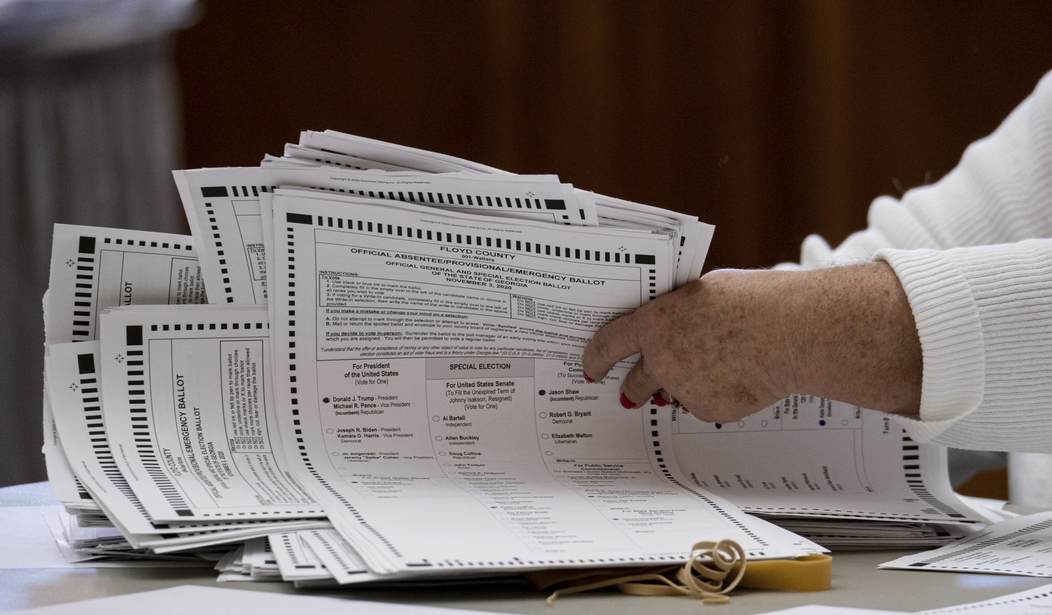Are we living in an era of political contentment? Most Americans would answer that question with a bellowing "No!" But there's a case to be made that American voters, for all their negative talk, actually don't want a set of public policies markedly different from what we have today.
Note that that seems to be the practical result of the 2022 midterm elections last month. Republicans eked out exactly the same narrow House majority the Democrats had won in 2020. This seems likely to prevent any further policy lurch to the left. And the Democrats' retention of a narrow Senate majority, and of course the White House, prevents a lurch to the right.
Nationwide, precious few incumbents were ejected from office. Just one governor lost -- Steve Sisolak of Nevada, who had been elected with 49% in 2018. No U.S. senator lost, although Georgia's Raphael Warnock, elected with 51% in a 2021 runoff, could lose in the runoff next Tuesday.
Some 25 House incumbents, 13 Republicans and 12 Democrats were defeated in November or in primaries. But redistricting following the 2020 Census was a factor in 14 cases, and four cases were defeats of Republicans who voted to impeach Donald Trump after Jan. 6. Overall, it's hard to see how the voters could have done a better job of cementing in place the policy status quo.
How do I square that with consistent negative poll results? The fact is that most voters over the past two decades -- actually, for most of the time since I got into the political commenting business more than 50 years ago -- have been telling pollsters that the country is pretty seriously on the wrong track.
Recommended
Half a century ago, such negative feelings were enough to oust incumbent presidents. Richard Nixon was forced out of office in 1974 and his two successors, Gerald Ford and Jimmy Carter, were defeated in 1976 and 1980.
In that same period, voters, most of whom had living memories of the Great Depression and World War II, reelected by landslide margins presidents who appeared to produce peace and prosperity. Lyndon Johnson in 1964 and Nixon in 1972 won with 61% of the vote, and Ronald Reagan in 1984 won with 59%.
But with the onset of a politics of partisan parity and polarization in the first half of the 1990s, voters have reelected incumbent presidents by nothing like those margins and vented their discontent in midterm elections.
Thus Bill Clinton was reelected with 49% of the popular vote in 1996, and George W. Bush and Barack Obama were each reelected with 51% in 2004 and 2012, respectively.
In that context, Donald Trump's 47% of the popular vote in 2020, while certainly not the landslide win he claimed, was not a landslide rejection either -- it was actually slightly higher than his 46% four years before. The outcome was different because Hillary Clinton lost three of the four closest (in percentage terms) states in 2016, whereas Trump lost the three closest in 2020.
Incumbent congressional majorities have not fared as well. Democrats suffered landslide losses in 1994 to almost everyone's surprise, in the 2010 House election to somewhat less surprise and in 2014 when Republicans won more House seats than in any year since 1928 and recaptured a majority in the Senate.
In each case, there was a recoil against an attempted or successful leftward lurch in public policy -- to Hillarycare in 1994 and Obamacare in the 2010s.
Republicans suffered off-year losses as well, of majorities in both houses in 2006 and of their House majority in 2018. Their problem seemed to be less ideological overreach than a sense of turmoil. Bush's Republicans suffered from scenes of disorder in the streets of New Orleans and Baghdad. Trump's Republicans suffered from stories about disorder in the West Wing and Mar-a-Lago.
Curiously, Obamacare was highly unpopular throughout Barack Obama's two terms, but then the Obamacare repeal became unpopular with Trump and congressional Republican majorities in office.
This year, there was little positive appeal to the Biden Democrats' big government programs -- note the absence of mourning when their enlarged child tax credit expired. But that was apparently offset by the persistence of Trumpish turmoil throughout the fall campaign and on into his dinner with Holocaust-denier Nick Fuentes last week.
My tentative conclusion is that voters are more satisfied with America's current policy mix than they are prepared to say. They have little interest in economic redistribution in a nation that, as I have noted, already has the developed world's most progressive income tax and where government transfers produce equal disposable incomes for those on the bottom 60% of the economic ladder.
The result is a nation claiming it faces a Shakespearean "winter of our discontent," which nonetheless votes for the policy status quo.
























Join the conversation as a VIP Member